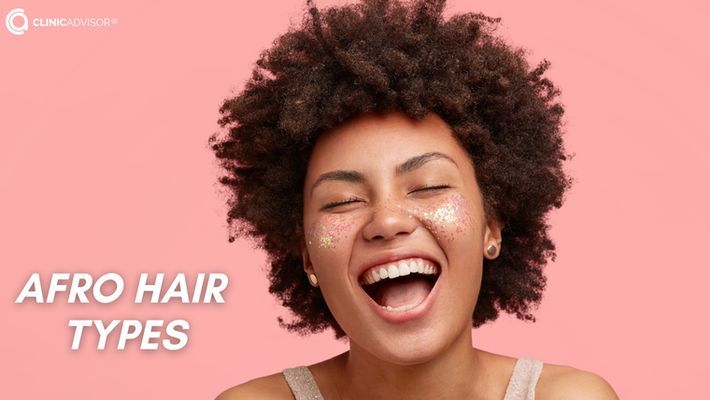
Afro hair is a very unique type of hair that has a beautiful curl pattern and a distinct texture from other hair types. This requires knowledge of how to deal with this type of hair and care for it in the best way possible.
Despite its different qualities, Afro-textured hair has often been misunderstood leading to a lack of representation and a history of damaging beauty standards.
However, the new movements of embracing natural hair have encouraged people to promote pride and appreciation for all hair types, including Afro hair.
Today, more and more people are embracing their natural curls regardless of their pattern and texture.
In this guide, we will address all the different types of African American hair, their characteristics, the best way to care for your hair, and things to avoid.
What is Afro hair?
Afro, aka ‘fro’ in slang, is a term used to describe a hair type that is characterized by having very tight curl patterns that range from defined curls to undefined tiny coils.
This hair type is commonly found in people of African origins.
Afro hair can range in texture from fine and soft to thick and coarse. There are also different curl patterns in Afro-textured hair which varies from loosely defined curls to tightly packed coiled curls.
Although it can be difficult to manage due to its tendency to dry out and break easily, Afro hair has a unique structure compared to straight hair, and it requires different care and styling techniques.
It is important to use the right products that are specifically designed for Afro-textured hair and to be gentle when combing or brushing the hair to prevent damage.
Characteristics of Afro Hair
There are many characteristics of Afro hair that make it unique. Some common characteristics include:
- Tight curl pattern: Afro hair has a naturally tight curl pattern that ranges from loose identifiable curls to very tightly coiled curls.
- Coarse texture: Afro-textured hair tends to be coarser and thicker as compared to other types of hair.
- Natural volume: African American hair has a natural volume and bounces due to its tightly compacted curl pattern.
- High porosity: Afro hair is often more porous than other types of hair, which means that it absorbs moisture and products easily but can also lose moisture quickly.
- Dryness: Although many people think that Afro hair does not produce enough oil (sebum) which leads to dryness; however, that’s not the case. Actually, Afro hair produces oil but due to its growth direction and the tight curls pattern, hair strands don’t get well lubricated leaving the ends dry and brittle.
- Breakage: Afro hair tends to be brittle and susceptible to breakage due to its tight curl pattern and the fact that it can be easily damaged by heat and chemical treatments.
- Hair growth direction: type 4 Afro hair grows in a different direction than other types of hair. It grows upward rather than down and that’s due to the fact that the hair follicles of Afro hair are flattened rather than circular or oval. This results in tight curls growing out rather than down.
What are the types of Afro-hair?
According to Andrew Walker’s Hair Type System, Afro hair is classified as Type 4 hair which is characterized by kinky, highly compacted curl patterns and a naturally big volume.
Multiple curl patterns can be found in Type 4 Afro hair. It ranges from springy S-shaped curls to a more coarse and wiry Z-shape.
Type 4 hair is further divided into three subcategories symbolized by a letter: 4a, 4b, and 4c.
These subcategories indicate the texture and the type of curl of Afro hair.
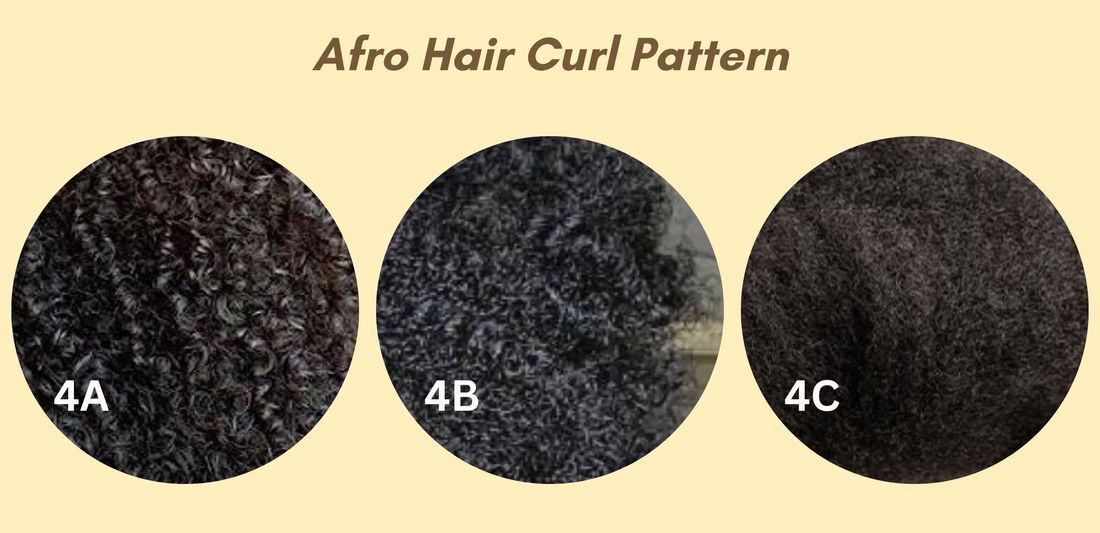 Afro hair curl pattern
Afro hair curl pattern
4A Hair
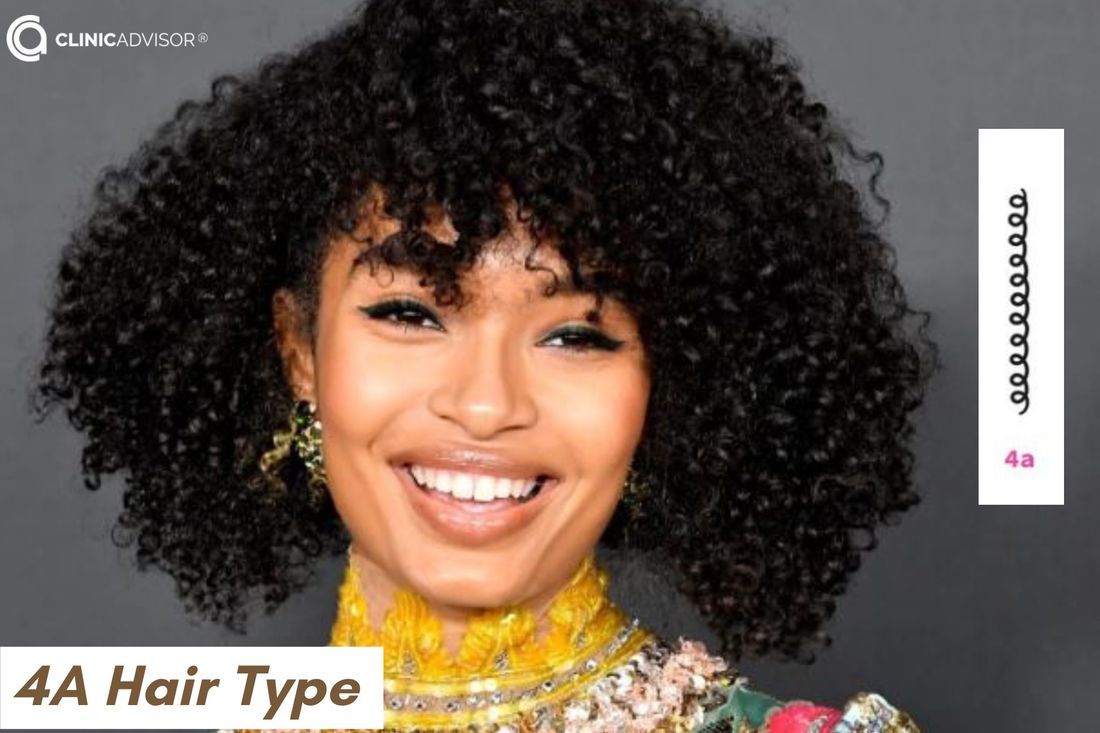 4a Afro hair type
4a Afro hair type
This type of Afro hair is characterized by having loose and defined curls that are easily identifiable. It has more defined S-shaped spiral curls and it is easy to style more than 4B and 4C hair.
When looking closely at these curls you will see that the curls are not intertwined with the other surrounding hair strands but rather each strands curls separately.
If you compare it to 4B and 4C hair types 4A has the advantage of being less prone to breakage due to its loosely packed curls.
4B Hair
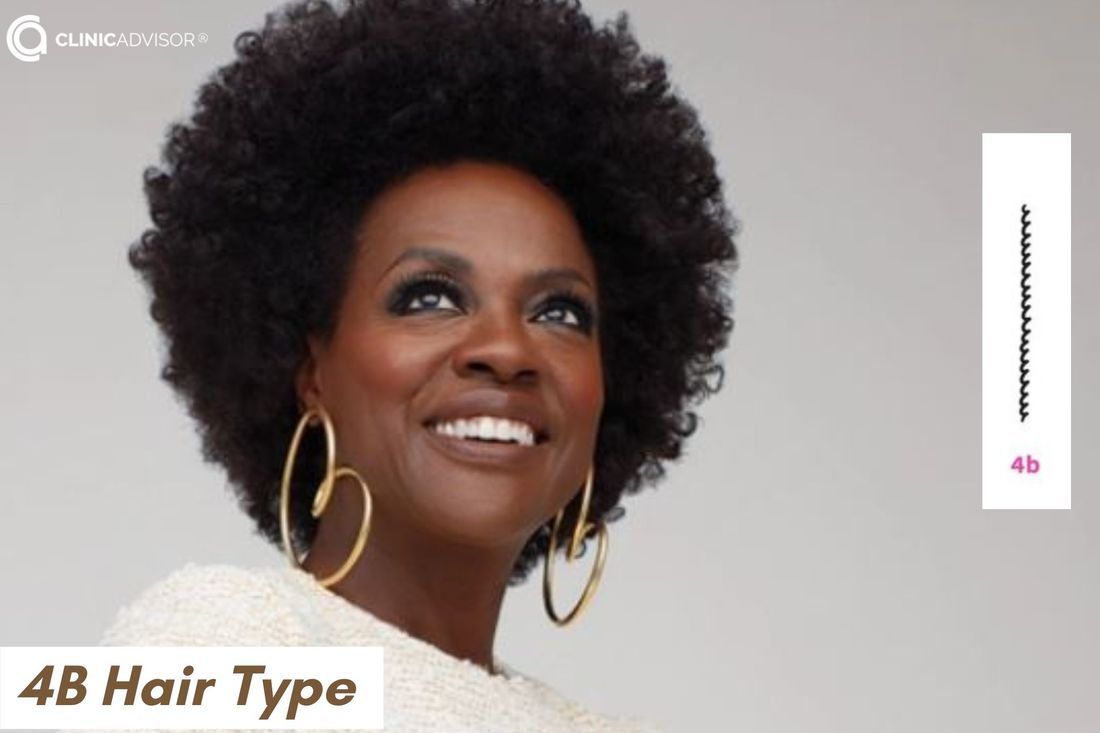 4b Afro hair type
4b Afro hair type
This type of African hair has a tighter Z-shaped or zigzag curl pattern and is either fine or wiry in texture. The curls are less defined than 4a hair and it also looks fluffy and more voluminous.
Due to its shrinkage ability of about 70% of its actual length the 4B hair looks short when it’s dry.
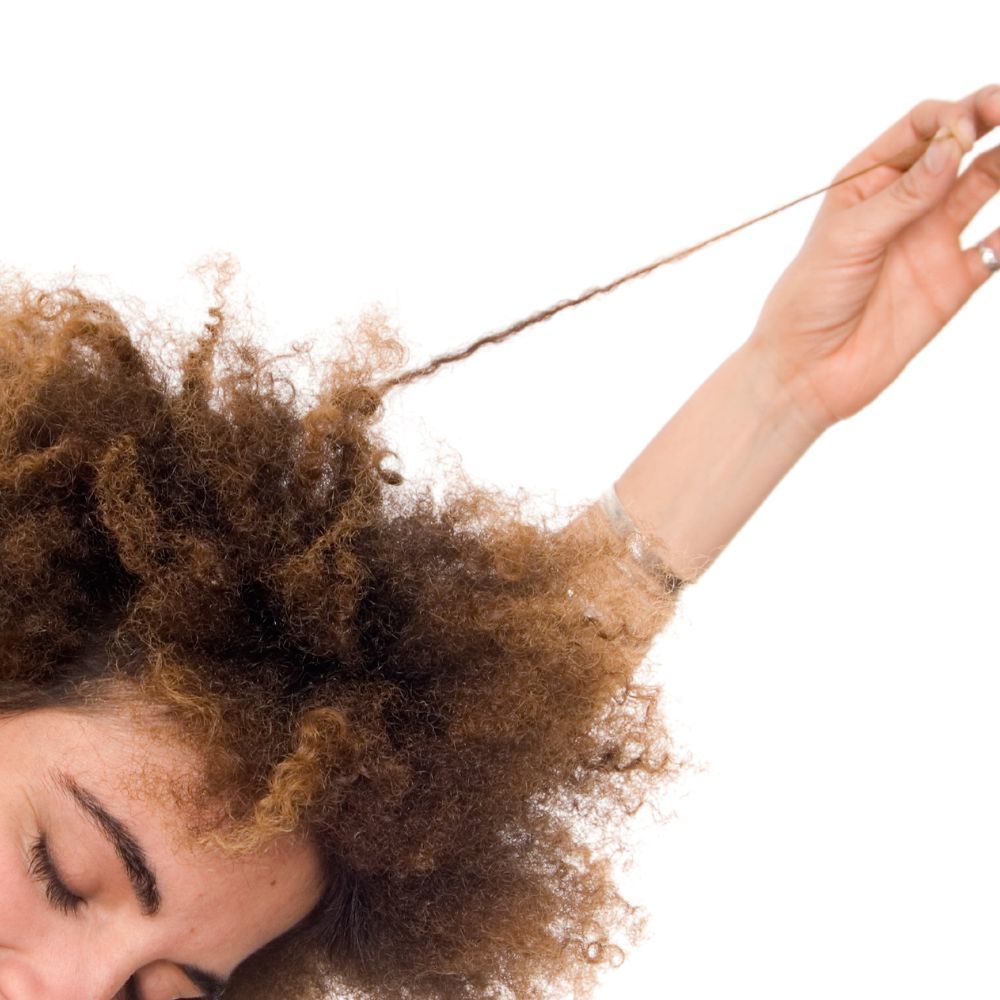 Afro hair shrinkage capacity
Afro hair shrinkage capacity
In order to be able to clump and style 4B Afro hair you need to moisturize your hair very well using oil or butter-based moisturizers like shea butter or castor and coconut oil.
4C Hair
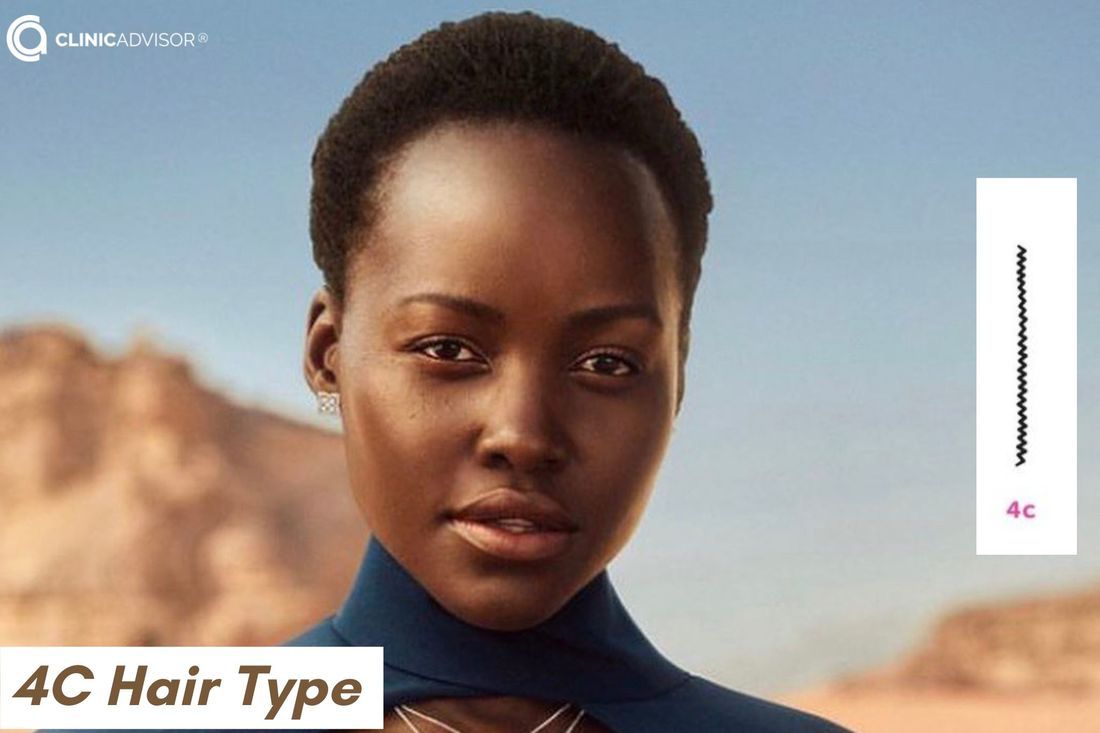 4c Afro hair type
4c Afro hair type
This is the densest and coarsest of the Type 4 hair types. Type 4C hair resembles thick but undefined coils. Coils are normally different than curls in that they are small springs that are less identifiable when seen from a distance but when you get closer you can see the tiny coils interlocked and densely packed together.
Due to its coiling pattern, the hair looks very short while it’s actually not. The reason for that is that 4C hair has the highest shrinkage level of about 75%. But when it gets wet it can really shock you with its actual length.
This hair type requires very gentle and careful care as it can break very easily since the coils are tightly interlocked. Most 4C hair wearers tend to use Afro protective hairstyles such as twisting and plaiting to make it easier for them to style their hair.
How do I know my African hair type?
If you want to know your African hair type you can simply see your natural curl pattern by looking at your hair when it is dry in its natural state, without applying any styling products or heat-based tools.
This way you can clearly see the shape and size of your curls. After that, you can compare it with the different Afro hair types using the hair type chart.
One of the famous hair type charts is by Andrew Walker. It can be a very useful tool to give you a start in identifying your hair type and under which category it falls.
This chart often classifies hair into categories such as Type 1, 2, 3, and 4, and so on, based on the curl pattern and texture of the hair.
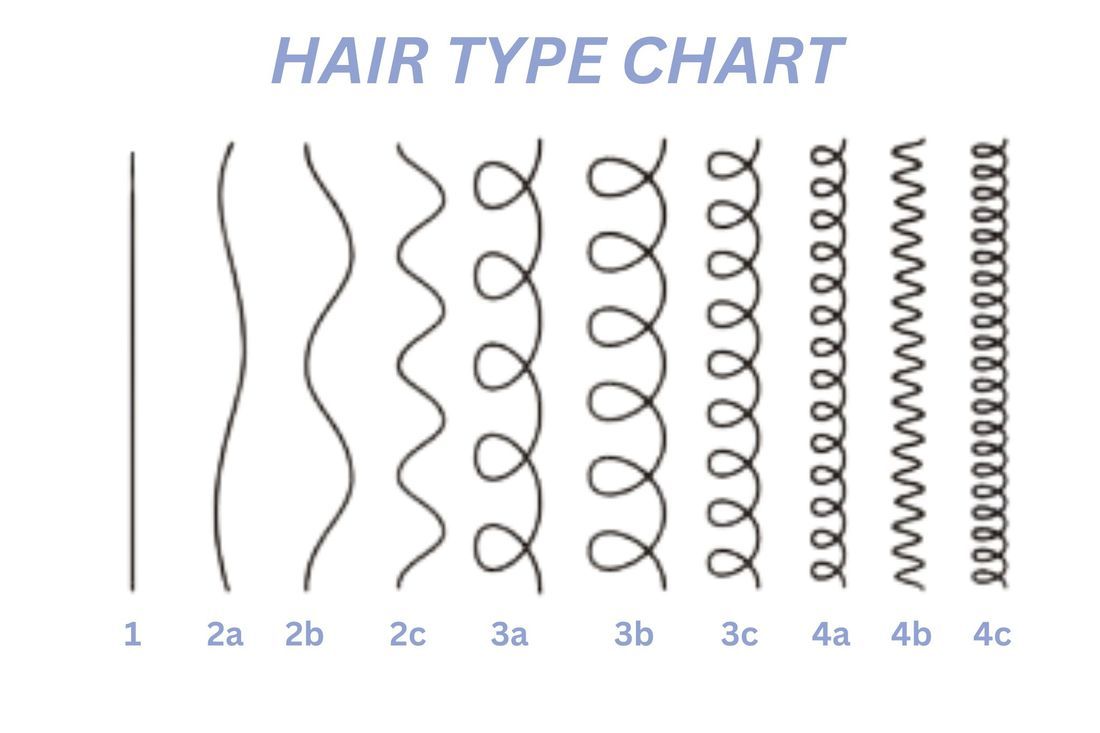 Hair Type Chart
Hair Type Chart
Please note that your hair can have multiple curls that might not fit into only a single category.
Why is it important to know your Afro hair type?
Knowing the type of your hair regardless of whether it’s wavy, curly or Afro is very important in giving you an idea about the different hair care routines, products, and styling methods that are suitable for your hair to keep your hair healthy and nourished.
The same applies to Afro hair which is known for having very tight coils that are more susceptible to breakage and dryness.
What is the best way to care for African American Hair?
Having African American hair can require more care than other types of hair such as straight or wavy hair.
Because it has a special texture and a different curl and growth pattern, people with Afro hair must follow several steps to care for their hair and keep it healthy:
- Go sulfate-free: Sulfates are cleansing agents that clean the hair and scalp from excess oil, dirt, and product buildup. But one of the downsides of sulfate-infused shampoos is that they can strip the hair of its natural oils, making it dry and brittle. And since Afro hair is prone to dryness more than other hair types it’s better to avoid it. Instead, you can opt for a sulfate-free shampoo to gently cleanse the hair without stripping it of its natural moisture.
- Moisturize regularly: we have talked about how Afro hair is more susceptible to dryness which requires regular moisturizing either by using a leave-in conditioner or hair oils to keep the hair strands well hydrated and reduce breakage.
- Avoid the heat: Heat-based styling tools, such as flat irons and curling irons, can damage Afro hair and lead to breakage.
- Choose the right comb: using a fine-tooth comb or brush on Afro hair, can make the hair break easily. Instead, it’s recommended to opt for a wide-tooth comb or simply your fingers to gently detangle the hair when it’s wet.
- Protect your hair while sleeping: type 4 hair Afro hair is prone to breakage; therefore, it’s very important to protect it while sleeping and reduce friction. You can do this by either wrapping your head with a scarf made of satin or silk or changing your cotton pillowcase with one made of satin or silk. These materials are less likely to cause friction and breakage than cotton or other materials which make the hair snap.
- Avoid protective hairstyles: some hairstyles, such as cornrows and braids, are very popular among people with Afro hair. But this can cause a lot of tension on the hair and the scalp leading to hair loss. Instead, it’s better to opt for looser styles and benefit from hair products that are tailored for afro hair.
- Trim the ends regularly: Afro hair is prone to breakage and split ends, spa regular trim for the ends will keep your hair healthy and prevent breakage.
- Avoid harsh chemicals: using chemical treatments, such as relaxers, can weaken the hair and lead to hair loss.
How hair discrimination at work leads Black Women to resort to harsh chemical straighteners:
In the realm of Afro hair, where a rich tapestry of curl patterns and textures flourish, there exists a complex narrative. Beyond the celebration of this unique beauty, it's crucial to acknowledge the systemic challenges faced by Black women, particularly in the workplace. The journey towards embracing natural Afro hair is not without its struggles. Many Black women have, for generations, contended with workplace hair discrimination, a painful reality that has compelled some to resort to harsh chemicals and heat treatments in pursuit of conformity to Eurocentric beauty standards.
Startling statistics emphasize the gravity of this issue. According to an article by the Harvard Business Review, black women's hair is reported to be two-and-a-half times more likely to be perceived as unprofessional. Shockingly, more than half of the Black women surveyed expressed the belief that they had to wear their hair straight in a job interview to be successful. Furthermore, the impact of hair discrimination extends to the point where one-fifth of Black women surveyed between the ages of 25 and 34 had experienced the distressing situation of being sent home from work solely because of their natural hair.
This deeply rooted problem was thoughtfully brought to our attention by Elvira Camargo of Consumersnotice.org, who highlighted the importance of addressing these disparities in our exploration of Afro hair types. It's a reminder that our commitment to celebrating diversity in all its forms goes beyond hair; it extends to the narratives and experiences of the people who carry this unique heritage.
Is hair density in African Americans high or low?
In a study that compared the hair density between African American and white patients, it was found that the hair density was lower in African Americans.
The fact that the Afro hair type is characterized by having very tight and coiled curls that start curling from the root, gives the illusion of higher density.
While the truth is the number of hairs per square inch in African hair is lower than in other hair types such as Asian and Caucasian hair.
However, hair density can vary greatly within the same racial or ethnic group. Some people with Afro hair may have a lower density, while others may have a higher density which is largely determined by genetics.
Afro hair styling and hair loss
Although opting for protective hair stylings, such as plaits, cornrows, and twists, can save a lot of time for people with Afro hair but it can potentially cause hair loss.
Tight hairstyles can put a lot of stress on the scalp, leading to what is known as Traction Alopecia. Traction alopecia is hair shedding due to frequently wearing hair very tightly.
Additionally, wearing a protective hairstyle for long periods can prevent moisturizing products from nourishing each strand keeping hair dry and brittle.
And finally, when protective styles are not properly cared for it can lead to scalp or follicle infection which eventually causes hair loss.
Note: To reduce the risk of hair loss caused by Afro-protective styling it’s important not to wear these hairstyles for too long and remove them from time to time to give your hair a chance to recover. |
Can someone with Afro hair get a hair transplant?
People with type 4 hair (Afro hair) are able to get a hair transplant to restore their lost hair.
However, due to the nature of the Afro hair and the tight curl patterns, it is very important to get it done by a skilled surgeon who has enough knowledge of the special traits of African American hair.
A successful result will start with the right planning and diagnosis of the hair.
Your surgeon will determine the most suitable method, the number of grafts required, and the precise creation of recipient sites that match the structure of Afro hair follicles.
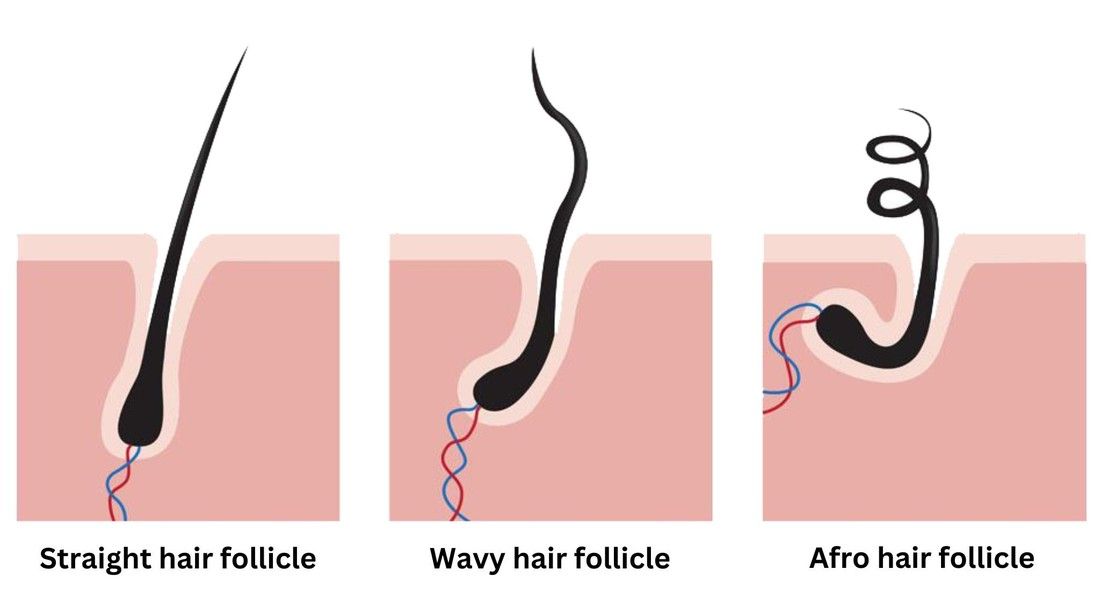 Structure of Afro hair follicle
Structure of Afro hair follicle
Do you want to get an Afro hair transplant but are not sure where to start? Talk to our team of experts at ClinicAdvisor to find the best hair transplant clinic.
Sources:
- Image by: <a href="https://www.freepik.com/free-photo/sideways-shot-pleased-dark-skinned-young-female-has-curly-hair-broad-smile-dressed-casual-clothing_9590801.htm#query=afro hair&position=15&from_view=search&track=sph">Image by wayhomestudio</a> on Freepik
- https://hbr.org/2023/05/how-hair-discrimination-affects-black-women-at-work

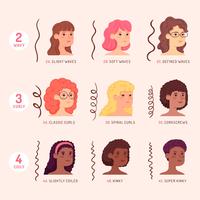
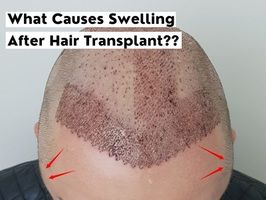





Share Your Opinion, Please